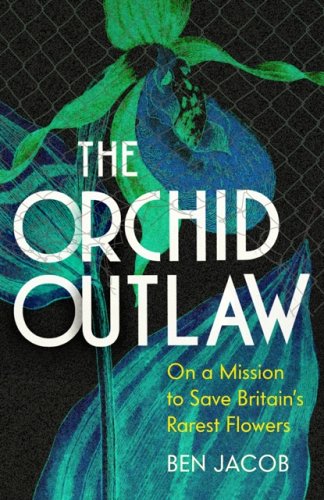The Orchid Outlaw was published this month. It gives me a chance to redress the balance from books I should have read years ago where climate policy is now hopelessly out of date, to an up-to-date account of one man who technically breaks the law every time he does something useful, but since everyone else is wriggling through the gaps (thanks to Cameron’s evisceration of the UK planning laws), he feels he can justify himself in court. Take the higher ground, or something. Thank you to Netgalley and the publishers for the chance of an ARC.

The Orchid Outlaw
by Ben Jacob
Ten years ago, Ben Jacob turned outlaw to save our rarest flowers. This is his story.
Obsessed by orchids since childhood, Ben spent his twenties travelling to far-flung jungles to see them in the wild. Returning to the UK, he was entranced to discover our fifty-one native species and their exotic stories: the Bee whose flower looks (and smells) so much like one that even bees are fooled, the Ghost which exists without direct sunlight, and the Autumn Lady’s-tresses that helped Darwin work out his theory of evolution.
But Britain’s orchids are in desperate trouble. Decimated by changes in land use and climate, inadequately protected by environmental and planning laws, many are on the brink of extinction. Determined to act before it was too late, Ben started sneaking into building sites in the dead of night to rescue threatened plants. Then he turned his kitchen into a laboratory, his fridge into storage for hundreds of baby plants and his back yard into an orchid refuge. The next challenge was finding them safer new homes . . .
At once a memoir, a natural history, and an inspiring call to action, reintroducing us to Britain’s most endangered flowers, The Orchid Outlaw shows us how we can all save the world, one plant at a time.
My Review
Ben Jacobs starts his book with some very scary (and dangerous, and life-threatening) orchid encounters in tropical places. Having had time to reflect, while laid up for months safely in the parental home, he discovers there are orchids in his father’s garden. British orchids. Safe in his parent’s garden. Nobody likely to build houses on them, drain their habitat, trample or pick them. Which, when he starts looking further into the story of British native orchids, is exactly what is happening to most of them, and a fairly good reason why they are in terminal decline, and not even recognised as threatened by the conservation labels (which are hopelessly out of date). More than that, while some people are monitoring them, in the name of conservation, nobody is succeeding in reversing the decline.
By now you are probably working out that Ben Jacobs is covering a lot of ground in this book. Law, science, and simple botany, plus habitat niceties, policy of local government officers and other groundkeepers… and did I say simple botany? Orchids are anything but simple. They are the most amazing, most complicated flowering plants you can imagine, and it turns out they even have their own mycorrhizal fungi they like to cohabit with (like trees).
Plus history. The history of natural philosophers’ and alchemists’ interest in orchids goes back to mediaeval times. Written about and drawn for centuries, with wild imaginings of what they do and can do if used for medicinal purposes. Fact and fiction rolled into one, until a few learned people, including Darwin, put some sense into it all. And they are still being classified and reclassified as botanists study them in more detail. I wish, as does Ben Jacobs, some people would put more effort into restoring them in the field. More protection from housing estates would go down well, too. Although there are some gains. The undisturbed spoil tip from the Channel Tunnel, now a nature reserve, is a chalk hill with ideal conditions for some of our rarest species (butterflies too).
This is a fascinating book, with a huge amount of information, and lots of references plus further reading. It’s properly put together and on the whole made for good reading. But it does tend to leap about a bit, and I think the editor could have done a better job to help Jacobs make it flow. Despite that, I gave it four stars on Goodreads, which means that the content far outweighs its faults.
I did have a slight irritation with his absolute refusal to gain permission. He’d probably have been fine with the golf club, if he’d asked if he could do a wildflower survey and they could include it in their environmental status report. Golf clubs need that, not lone men lurking in bushes unexplained. There’s a lot of vandalism on golf courses, as well as safety concerns for young people playing golf. And if you think I’m joking–I’ve done bird surveys on golf courses. Of course, he’s probably a more suspicious character than I am 🙂


A very interesting review, a book we should be getting school children to read. A book to help take steps to save the planet 💜
Should be required reading in all school and college throughout the land. It should be a recommended read in every library. Thank you for a fine review Jemima. Hugs
A worthy aim, but I’m not sure I’m cut out to be an outlaw so I’ll leave him to it!
Working unilaterally to save the plants is good. Even better is working to change the laws so they aren’t being destroyed without a care. Still, sounds like a book worth reading.
Pingback:Book Review | The Milkweed Lands - Jemima Pett